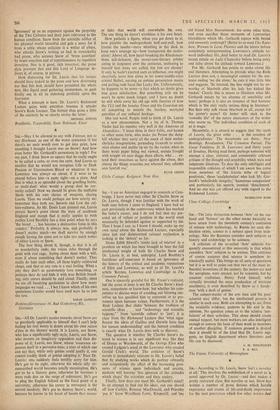Sta,—1 am an American engaged in research at Cam- bridge.
I have never met either Sir Charles Snow or Dr. Leavis, though I was familiar with the work of both men before I came to England. I have had no part previously in the controversy which has marked the latter's career, and I do not feel that my per- sonal set of values or position in• the world must necessarily be defended against or supported by his. Thus I hope I can, as I know I should, make up my own mind about the Richmond Lecture, especially since just and disinterested rational evaluation is lacking in the 'debate' so far.
Dame Edith Sitwell's 'entire lack of interest' in a problem on which has been brought to bear the full intellectual weight of both Sir Charles Snow and Dr. Leavis is, at best, unhelpful. Lord Boothby's fastidious self-assurance is based on ignorance of the history of the critical and academic reputations of Eliot and Lawrence, as well as of Dr. Leavis's article 'Keynes, Lawrence and Cambridge' in The Common Pursuit.
One is sincerely grateful for Mr. Fraser's restraint, but the point at issue is not Sir Charles Snow's kind- ness, earnestness or know-how, but whether his com- petence to discuss ways of avoiding our blowing our- selves up has qualified him to represent or to pro- nounce upon humane values. Furthermore, it is the Rede Lecture that slides 'between the tradition .of scientific ideas . . . and "technology and scientific hygiene,"' from 'scientific culture' to 'jam'; it is clear from the Richmond Lecture that 'what signi- ficance the ideas of Galileo and Darwin have had for human understanding' and the human condition is exactly what Dr. Leavis does seek to discover.
The question is whether Sir Charles Snow's in- terest in science is in any significant way like that of Donne or Wordsworth, of the George Eliot who created Lydgate's mind or the Lawrence who created Gerald Crich's world. The criticism of Snow's novels is immediately relevant to Dr. Leavis's belief that by studying works which do portray vibrantly and scrupulously the effect of the increasing pres- sures of science upon individuals and society, students will become 'less ignorant of the attitudes which shape' the scientists and their society.
Finally, how does one meet Mr. Gerhardi's mind? In an attempt to find out his ideas, can one shovel off how Carlyle, Ramsay MacDonald, and Priestley 'put it.' leave Wyndham Lewis. Kingsmill, and 'my old friend Max Beaverbrook' for some other time, and even sacrifice those moments of Lawrentian friendliness which Mr. Gerhardi, repays with brutal and unseemly contempt? (Better to re-read The Rain- bow, Women in Love, Phoenix and the letters before completely misrepresenting Lawrence's attitude to- ward individual life..And better to read Dr. Leavis's recent article on Lady Chatterley before being petty and false about his attitude toward Lawrence.) For Mr. Gerhardi has points to make about life and literature. Attempting to provide what the Rede Lecture does not, a meaningful context for the sen- tence ending 'we die alone,' he cuts it into little bits and suggests, 'So intoned, the line might not be un- worthy of Macbeth after his lady has kicked the bucket.' Clearly this is meant to illustrate what Mr. Gerhardi means by 'an absence of sensibility and taste;' perhaps it is also an instance of that humour which is 'the only really serious thing in literature.' But then why talk about Macbeth at all, except for the porter's scene? Or better still, stick to the 'comedic life' of the minor characters of the writer who warns us, 'The individual condition of each of us is tragic.'
Meanwhile, it is absurd to suggest that 'the myth of Leavis, the great critic . . . is the creation of undergraduates.' The documents are there: New Bearings, Revaluation, The Common Pursuit, The Great Tradition, D. H. Lawrence, and thirty years of Scrutiny. Having read them, perhaps someone will attempt a clear, rational, and consistently relevant critique of the thought and sensibility which style and judgments illustrate. To date the only intelligent and responsible criticism of which I am aware has come from members of 'the Leavis tribe of logical positivists,' those 'analphabetics' who lack Mr. Ger- hardi's 'unbribable integrity,' humorous compassion' and particularly his superb, ironical 'detachment.' And no one has yet offered any with regard to the Richmond Lecture.
REMINGTON ROSE
Clare College, Cambridge


































 Previous page
Previous page